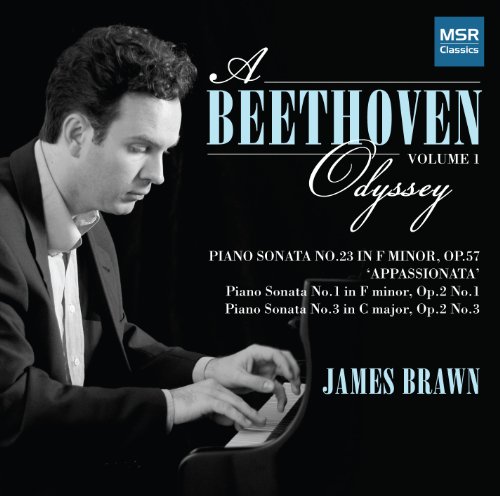A Beethoven Odyssey - Volume 3: Piano Sonata No.2; Piano Sonata No.17 The Tempest; Piano Sonata No.26 Les Adieux


Beethoven's music accompanies musicians throughout their lives. As a child, Brawn experienced the dramatic opening strains of the Fifth Symphony and listened to his mother practice the haunting Moonlight Sonata. These early impressions inspired him to begin piano study while living with his family in New Zealand. He first performed Beethoven's Piano Concerto No.4 in G major in Australia at the age of thirteen.
During his teenage years in Australia, Brawn studied with pupils of Beethoven interpreters like Solomon Cutner, Claudio Arrau, and Rudolf Serkin, all of whom had a strong connection to and affinity with the composer's music. He later entered the Royal Academy of Music in London, where he received the Beethoven Prize for a performance of the Waldstein Sonata. More recently, he has given recitals in both hemispheres that included the Pathetique, Moonlight, Tempest, Waldstein, Appassionata, and Les Adieux sonatas.
These pieces are entirely modern, relevant, and necessary to life in the twenty-first century. The pianist finds himself in the role of time traveler and medium, thus becoming the link between Beethoven and present-day audiences. Despite their enormous physical, intellectual and emotional challenges, these sonatas provide the kind of artistic fulfillment that pianists like Brawn crave. Listeners all over the world are the lucky beneficiaries of recording projects such as this, which make new and highly personal interpretations of these great works available to a larger audience.
An Australian debut in Mozart's Piano Concerto No. 25 marks the start of pianist James Brawn's solo career at the age of twelve. Brawn credits all subsequent achievements to the great pianists with whom he was privileged to study. He takes justifiable pride in the fact that his teachers trace their pedagogical lineage back to Beethoven, Chopin, Liszt, and Clara Schumann.
Yet Brawn has also forged his own path as a solo performer, chamber musician, and pedagogue. Born in England in 1971, he has lived in New Zealand, Australia, the UK, and the United States. Brawn's musical journey began in New Zealand, where he started piano lessons at age seven. He played Bartok on New Zealand television and, in 1979, won his first awards in Auckland. The family moved to Australia the following year. There, he studied with Margaret Schofield, Ronald Farren-Price, and Rita Reichman throughout the 80s. The talented young pianist won major prizes at all the Melbourne Eisteddfods competitions. Yehudi Menuhin also awarded him the Hephzibah Menuhin Memorial Scholarship. In 1987, Brawn reached the concerto final of the ABC Young Performers Awards, which led to concerts with the Adelaide and Melbourne Symphony Orchestras.
A major overseas study grant from the Australia Arts Council enabled him to continue work with Rita Reichman in Philadelphia. In 1988, he received a full scholarship to the Royal Academy of Music in London. As a student there, Brawn won many recital awards, including the Beethoven and 20th century prizes. He also performed in master classes with Andras Schiff, Tamas Vasary and Stephen Kovacevich.
| Country | USA |
| Artist | James Brawn (piano) |
| Binding | Audio CD |
| EAN | 0681585146521 |
| Label | MSR Classics |
| Manufacturer | MSR Classics |
| NumberOfDiscs | 1 |
| NumberOfItems | 1 |
| PublicationDate | 2013-06-11 |
| Publisher | MSR Classics |
| ReleaseDate | 2013-01-18 |
| Studio | MSR Classics |